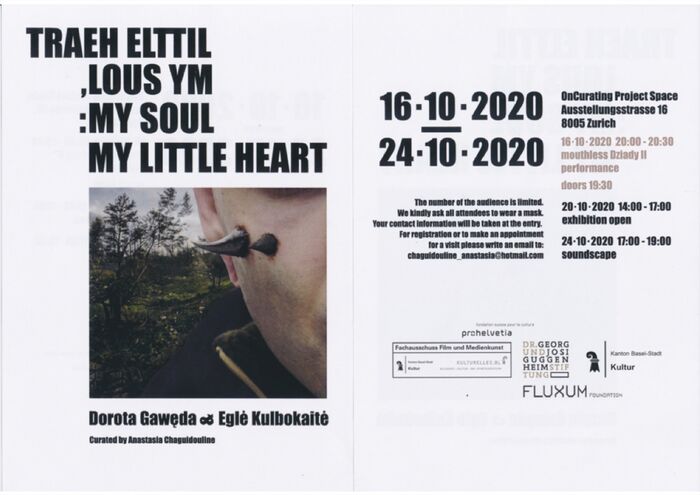Mouthless Dziady II — Dorota Gawęda und Eglé Kulbokaité
Interpretin Performerin für Dorota Gawęda und Eglé Kulbokaité
Hintergrund
ich habe in diesem 'hybriden' Projekt von Dorota Gawęda und Eglé Kulbokaité als Performerin nach ihrem Skript mitgewirkt.
Ankündigung der Ausstellung und Performance im ONCURATING Zürich
16—24 October 2020
traeh elttil ym ,lous ym : my soul, my little heart
Dorota Gawęda and Eglė Kulbokaitė
Opening event: 16 October 20:00—20:30 (Doors open 19:30)
Curated by Anastasia Chaguidouline
16 October 20:00—20:30 (Doors open 19:30)
Mouthless (Dziady) II (Performance)
20 October 14:00—17:00: Exhibition open
„Ages, nations, mortals mere
run away beyond the rim
like a playful water stream
in the Nature’s bending mirror.“
Velimir Khlebnikov
Gawęda’s and Kulbokaitė’s current work is based on Slavic and Baltic oral traditions and filled with pagan deities. Fluid in their gender and speaking in tongues these demons are conjuring a world without a separation of past, present and future, the human and non-human, the human and natural forces, the living and the dead. On Thursdays or most notably on October 31, the forefathers or dziady would pay the living, who would let doors and windows open and put food outside, a visit. Food was also handed out to the poorer members of society as dziad simultaneously meant a ‚poor person‘, leaving only little linguistic disjunction between being ancestor or family, and being poor. These rituals, witnesses of transcultural and transhistorical signifiers across disciplinary, social, geographic, and traditional boundaries reveal that the past was never actually ‘past’ at all. The dead, drowned, burned and buried live—they have always lived—in the spill, in the cyclical time, landscape and in folk horror.
With «traeh elttil ym ,lous ym : my soul, my little heart» the artists are evoking the eerie, inspired by tales and figures from a pre-communist and pre-capitalist past, where the coexistence of the living, dead and undead was built on respect and care. Through a mythico-poetic lense the artists are inspired by the ideas that have been guiding Russian cosmism: the past, the present, the future only represent fragments of the whole and continuous time that repeats itself elastically and cyclically in a circular development. It’s central ideas included the resurrection of all human ancestors, colonisation of all planets and stars, overcoming mortality with the help of technology and science. Cosmism aimed to replace God with human labour, opposed individualism, promoted the emancipation of the proletariat and fostered collaboration.
The invisible yet present fragrance Still Life reflects on our complex relationship with soil and the Earth, situated between attraction and repulsion, exploitation and preservation, instinct. The central piece of the exhibition, Mouthless (Dziady) II is a performance framed by a soundtrack which becomes the basis for interpretation, embodiment and improvisation. The choreography deploys repetition and reversed movement as a tool to illuminate the weirdness of the everyday. The ritual defies the strict sanctioning of the separation of the living from the dead imposed by the state. It opens a queer alliance between the conjurers and the various demons, dead, living and undead. Mouthless (Dziady) II will be presented as part of the Swiss Performance Art Award 2020 in Geneva on the 31 October 2020.
Dorota Gawęda (b. 1986, Lublin, PL) and Eglė Kulbokaitė (b. 1987, Kaunas, LT) are an artist duo founded in 2013, based in Basel (CH). Both are graduates of the Royal College of Art, London (2012). The multi-faceted practice of the duo founded in 2013 navigates between performance, installation, sculpture, video, text, sound and scent. Creating sensory environments that directly involve the audience, using both screen technology and organic elements, they generate fragmented narratives that echo our contemporary anxieties. Legends from Eastern Europe and elsewhere, witch trials, eco-feminist theories, science fiction and horror codes are brought together and to evoke contemporary ecological and identity crises.
